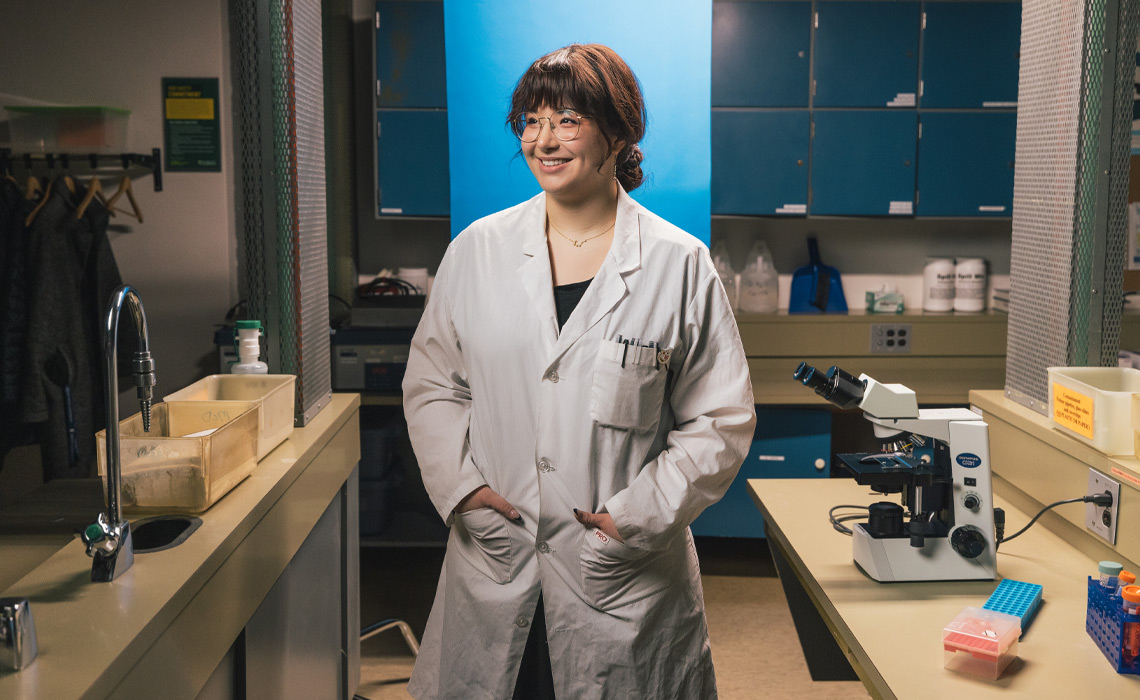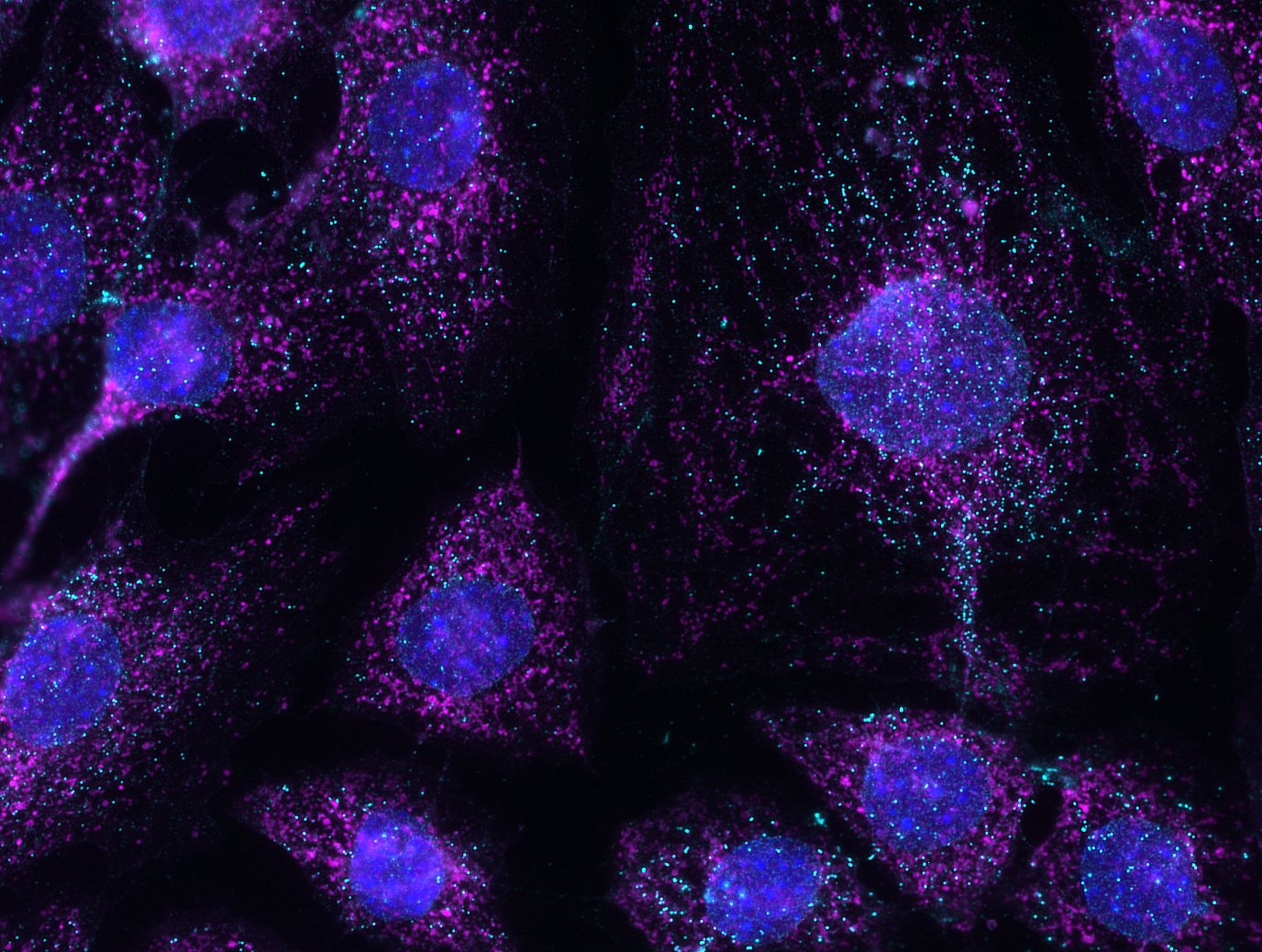The challenge seeker

When Emily Kingdon walks into her computational biology research lab, you might mistake it for an English lit office. Desks cluttered with computers, papers neatly piled, a dedicated (yet slightly messy) area for making coffee. But don’t be fooled — when it’s time to don her lab coat, Kingdon is in her element among the microscopes and test tubes.
“I love doing computational biology, but please don’t rob me of my wet lab work!” she says with a smile.
Kingdon is a graduate of MRU’s inaugural Bachelor of Science — Biology honours program. Currently in her first year of a master’s degree at the University of Alberta, she’s taking on new challenges and hoping to be part of the solution in the battle against a global parasitic threat.
Looking back, Kingdon credits many of her educators, especially those who challenged her and opened doors to new opportunities. One early influence was her Grade 5 teacher, Pat Jarabek, at the small 100-pupil St. William School in Calgary.
“Mrs. Jarabek was a little bit harder academically,” Kingdon recalls, “Since then, I've really appreciated having somebody challenge me and make me think a little bit harder.”
That same intellectual nudge drew Kingdon to the sciences in high school, where abstract thinking sparked her curiosity. Her parents’ love of science fiction also played a role.
“My father raised me right on Star Wars and Star Trek,” she laughs. “My parents were trying to expose me to as much of the media from when they were growing up as possible, to make sure I'm interesting to talk to now.”
When it came to selecting a post-secondary path, Kingdon’s choice was simple. “There's a lot of space for growth in the science fields. In biology, we still know virtually nothing about anything. There's always something new to learn, which I like because it's constantly evolving and engaging material.”
Opportunities beyond the lecture hall
Kingdon’s decision to attend MRU was influenced by several factors, including a memorable Open House visit during her last year of high school.
“I wasn't just one person in a sea of thousands. There were people who were willing to engage and tell me about their personal experiences at Mount Royal,” reflects Kingdon.
MRU’s small class sizes also helped seal the deal: “I liked the idea of being able to build more personal relationships with professors,” Kingdon says.
One of those connections — Dr. Elisabeth (Beth) Richardson, PhD, assistant professor in cell biology and genetics — became a pivotal mentor.
“I took her class on genomes, which was the first introduction any of us had to computational biology and bioinformatics,” Kingdon says. “When they came out with the biology honours program, Dr. Richardson was one of the supervisors for it.”
Kingdon was encouraged to apply for the program and subsequently joined Richardson's lab in comparative genomics, where she studied the genetic information of different organisms to better understand the proteins involved.
“Dr. Richardson provided this opportunity and she's become a mentor in my career,” Kingdon says.
“She's a wonderful woman, and terrifyingly smart.”

Kingdon’s undergrad achievements include winning a People’s Choice Award in the Natural Sciences and Engineering Research Council of Canada’s Science Exposed photo competition. Her image, “Cellular cosmos,” was an artful microscope image of mouse muscle cells taken during a fourth-year class on advanced cellular and molecular biology.
“We spent hours taking images, trying to find the perfect field of view that was aesthetically pleasing and then selecting our colours, choosing the pink and the blue. It was a really cool project to do, and I may not have gotten that opportunity as an undergrad elsewhere,” Kingdon says.
Growth through experiencing the "next level"
In spring 2024, Kingdon was one of the first-ever undergraduate students to attend the annual BioNet conference showcasing bioinformatics research in Western Canada. There, she presented the honours research work she did with Richardson and won the Noskov Memorial Award for Outstanding Poster Presentation.
In her thesis, Kingdon compared genes related to lipid droplets and a protein called seipin.
“This group of proteins is fairly under-researched, and we figured out which eukaryotic organisms, such as plants, animals and single-celled organisms, have these proteins present,” Kingdon says. “We learned that mammals have a lot of copies of this protein, which will require more research as to why. It could mean that mammals use seipin differently, or that mammals need more copies in order to fulfil functional needs. It poses a lot more interesting questions."
Participating in a graduate- and doctorate-level research conference was a huge opportunity for Kingdon. “It showed me how next-level everything is when you start looking at grad school, because everyone is just so impressive.”
Since graduating from MRU in 2024, Kingdon has started her master’s degree at the University of Alberta where she is supervised by Dr. Joel Dacks, a professor in the Faculty of Medicine and Dentistry.
Dacks also happened to be Richardson’s PhD supervisor prior to her move to MRU. Whether by coincidence or fate, Kingdon now works at the same desk she once occupied.
A global challenge: Giardia research
Kingdon is currently analyzing large data sets to understand the evolutionary history of proteins found in the parasite Giardia, which causes diarrheal disease. The parasite is especially prevalent in underdeveloped countries, attacking vulnerable populations including children.
“We think that by investigating these proteins, there's a chance that we could figure out exactly how Giardia causes damage to the hosts,” says Kingdon.
“Though it’s a very small part of a larger project, it would be incredibly exciting if our research into these proteins could help identify a potential release mechanism of the damaging molecules in Giardia, and therefore help us find better treatment methods.”
As part of her master’s journey, Kingdon will spend time in Switzerland in 2026 performing molecular parasitology on Giardia at a partner lab at the University of Bern. There, she’ll be mentored by Dr. Carmen Faso, a preeminent researcher in infectious diseases and parasitology.
“She is an absolute superstar and genius,” Kingdon says enthusiastically. “I’ll learn so much from her theory-wise, and since I'll be doing some more practical, hands-on, wet lab work when I'm there, I'm really excited for that, too.”
With mentors like Dacks and Faso continuing the tradition of pushing Kingdon to think harder and aim higher, the young researcher’s future looks bright. She’ll also have Richardson in her corner, serving as a sounding board for whatever comes next.
“I still don't know the answer to what I want to be when I grow up,” Kingdon says candidly. “The hope is that I can always be passionate and engaged in whatever I'm doing. If I can combine that with contributing to the larger body of research to help expand the common knowledge, maybe it helps people.
“Or, maybe something as simple as a paper of mine comes out and someday, a girl somewhere looks at it and goes, ‘Hey, I could do science, too!’”

